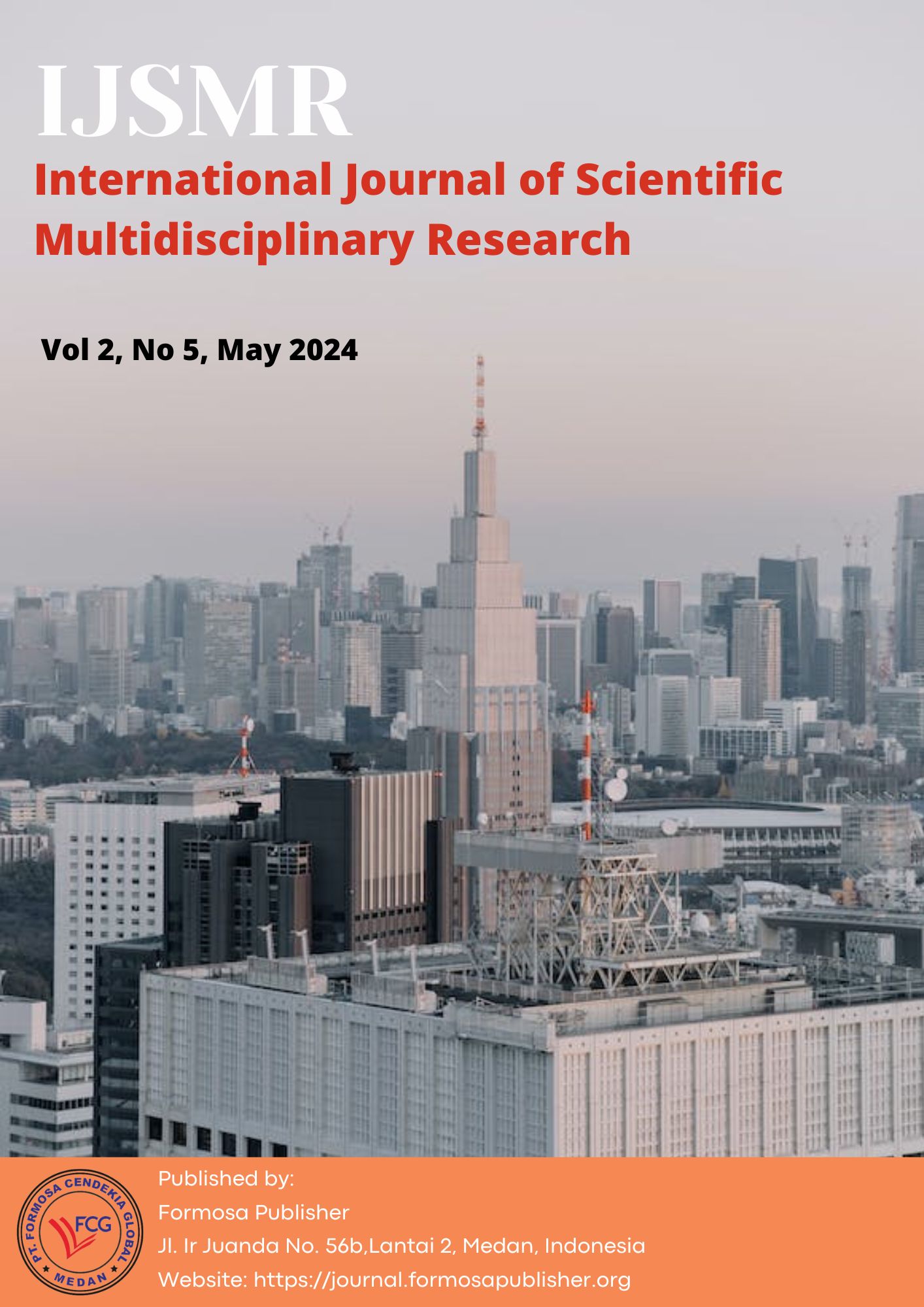Analysis of the Influence of Environmental Concern, Theory of Planned Behavior, and Theory of Reasoned Action on Purchase Intention: A Conceptual Paper
DOI:
https://doi.org/10.55927/ijsmr.v2i5.9138Keywords:
Environmental Concern, Theory of Planned Behavior, Theory of Reasoned Action, Purchase IntentionAbstract
The cosmetics industry is one of the industries that is currently an important necessity in people's daily lives. The cosmetics industry is an important industry for the economy. The green cosmetics industry in Indonesia has great growth potential. This study aims to validate the Theory of Reasoned Action (TRA) and Theory of Planned Behavior (TPB) models in predicting public attitudes towards purchasing intentions for environmentally friendly cosmetic products. Environmental concern, attitude, subjective norms, and perceived behavioral control (PBC), are expected to influence consumer decisions to buy green cosmetic products in Indonesia. This study's sample technique was nonprobability sampling. This is a sample approach that is chosen based on subjective assessment. Purposive sampling is the method utilized. The research sample consisted of customers who had used and purchased green cosmetic products in Indonesia who were then analyzed using Structural Equation Modeling (SEM) with the Partial Least Squares (PLS) technique in this research
Downloads
References
Aisyah, D. D., & Cahyasita, D. (2023). Investigating the factors influencing Indonesian Consumers' Intention to Purchase Green Products in Indonesia: Applying the Theory of Planned Behaviour. Bulletin of Agricultural Socio-Economic Research, Faculty of Agriculture, Haluoleo University, 25(2), 92-102. https://doi.org/10.37149/bpsosek.v25i2.840
Ajzen, I. (1991). The theory of planned behavior. Organizational Behavior and Human Decision Processes, 50(2), 179–211. https://doi.org/10.1016/0749-5978(91)90020-T
Ajzen, I. (2012). Martin fishbein’s legacy: The reasoned action approach. Annals of the American Academy of Political and Social Science, 640(1), 11–27. https://doi.org/10.1177/0002716211423363
Ajzen, I. (2020). The theory of planned behavior: Frequently asked questions. Human Behavior and Emerging Technologies, 2(4), 314–324. https://doi.org/10.1002/hbe2.195
Alika, R. (2021). KIC Survey: Consumers Willing to Pay a Premium for Sustainable Products. Katadata.Co.Id. https://katadata.co.id/ekonomi-hijau/ekonomi-sirkular/612499e309ba9/survei-kic-konsumen-bersedia-bayar-mahal-untuk-produk-berkelanjutan
Bagiartana, I. M. G. P., & Adi, I. N. R. (2023). Interest In Buying Millennial Generation Electric Motorcycles with Theory of Planned Behaviour and Environmental Concern as Determining Factors. Quantitative Economics and Management Studies, 4(6), 1227–1239. https://doi.org/10.35877/454ri.qems2120
Chen, C.-P., Tu, Y., & Tung, Y. A. (2020). A Study of Opinion Leaders in Green Consumption in Taiwan Using the Theory of Reasoned Action (TRA). International Journal of Sustainable Economies Management, 9(3), 33–50. https://doi.org/10.4018/ijsem.2020070103
Echchad, M., & Ghaith, A. (2022). Purchasing Intention of Green Cosmetics Using the Theory of Planned Behavior: The Role of Perceived Quality and Environmental Consciousness. Expert Journal of Marketing, 10(1), 62–71. https://orcid.org/0000-0002-8792-9271
Ginting, E. (2016). The Effect of Environmental Knowledge on Intention to Purchase Green Products on the "Attack" Brand with Environmental Concern as a Mediating Variable. 5(4), 2223-2249.
Hamzah, M. I., & Tanwir, N. S. (2021). Do pro-environmental factors lead to purchase intention of hybrid vehicles? The moderating effects of environmental knowledge. Journal of Cleaner Production, 279. https://doi.org/10.1016/j.jclepro.2020.123643
Han, H., & Kim, Y. (2010). An investigation of green hotel customers’ decision formation: Developing an extended model of the theory of planned behavior. International Journal of Hospitality Management, 29(4), 659–668. https://doi.org/10.1016/j.ijhm.2010.01.001
Hasan, M. M., Nekmahmud, M., Yajuan, L., & Patwary, M. A. (2019). Green business value chain: a systematic review. Sustainable Production and Consumption, 20, 326–339. https://doi.org/10.1016/j.spc.2019.08.003
Jayani, D. H. (2021). 5 Reasons Consumers Shop for Eco-Friendly Products. Databoks. https://databoks.katadata.co.id/datapublish/2021/08/24/5-alasan-konsumen-belanja-produk ramah-lingkungan
Mancini, S., Sogari, G., Menozzi, D., Nuvoloni, R., Torracca, B., Moruzzo, R., & Paci, G. (2019). Factors predicting the intention of eating an insect-based product. Foods, 8(7), 1–13. https://doi.org/10.3390/foods8070270
Nekmahmud, M., Ramkissoon, H., & Fekete-Farkas, M. (2022). Green purchase and sustainable consumption: A comparative study between European and non-European tourists. Tourism Management Perspectives, 43(November 2021), 100980. https://doi.org/10.1016/j.tmp.2022.100980
Park, E., & Kwon, S. J. (2017). What motivations drive sustainable energy-saving behavior?: An examination in South Korea. Renewable and Sustainable Energy Reviews, 79(May), 494–502. https://doi.org/10.1016/j.rser.2017.05.150
Paul, J., Modi, A., & Patel, J. (2016). Predicting green product consumption using theory of planned behavior and reasoned action. Journal of Retailing and Consumer Services, 29, 123–134. https://doi.org/10.1016/j.jretconser.2015.11.006
Salam, M. T., Smith, K. T., & Mehboob, F. (2022). Purchase intention for green brands among Pakistani millennials. Social Responsibility Journal, 18(3), 469-483. https://doi.org/10.1108/SRJ-08-2020-0341
Shanmugavel, N., & Balakrishnan, J. (2023). Influence of pro-environmental behaviour towards behavioural intention of electric vehicles. Technological Forecasting and Social Change, 187(December 2022), 122206. https://doi.org/10.1016/j.techfore.2022.122206
Sharma, A., & Foropon, C. (2019). Green product attributes and green purchase behavior: A theory of planned behavior perspective with implications for circular economy. Management Decision, 57(4), 1018-1042. https://doi.org/10.1108/MD-10 2018-1092
Shimul, A. S., Cheah, I., & Khan, B. B. (2022). Investigating Female Shoppers’ Attitude and Purchase Intention toward Green Cosmetics in South Africa. Journal of Global Marketing, 35(1), 37–56. https://doi.org/10.1080/08911762.2021.1934770
Statista. (2024). Revenue of the natural cosmetics market in Indonesia from 2019 to 2028. Statista. https://www.statista.com/forecasts/1220948/indonesia-revenue-natural-cosmetics-market
Tiscini, R., Martiniello, L., & Lombardi, R. (2022). Circular economy and environmental disclosure in sustainability reports: Empirical evidence in cosmetic companies. Business Strategy and the Environment, 31(3), 892–907. https://doi.org/10.1002/bse.2924
Wang, J., Wang, C., Li, S., & Luo, Z. (2021). Measurement of relative welfare poverty and its impact on happiness in China: Evidence from CGSS. China Economic Review, 69(November 2020), 101687. https://doi.org/10.1016/j.chieco.2021.101687
Wang, S., Wang, J., Yang, F., Li, J., & Song, J. (2020). Determinants of consumers’ remanufactured products purchase intentions: Evidence from China. International Journal of Production Research, 58(8), 2368–2383. https://doi.org/10.1080/00207543.2019.1630767
Zhang, W., & Luo, B. (2021). Do environmental concern and perceived risk contribute to consumers' intention toward buying remanufactured products? An empirical study from China. Clean Technologies and Environmental Policy, 23(2), 463-474. https://doi.org/10.1007/s10098-021-02061-8
Downloads
Published
How to Cite
Issue
Section
License
Copyright (c) 2024 Fanisa Tris Wandani, Arry Widodo, Nurafni Rubiyanti, Anita Silvianita

This work is licensed under a Creative Commons Attribution 4.0 International License.
















